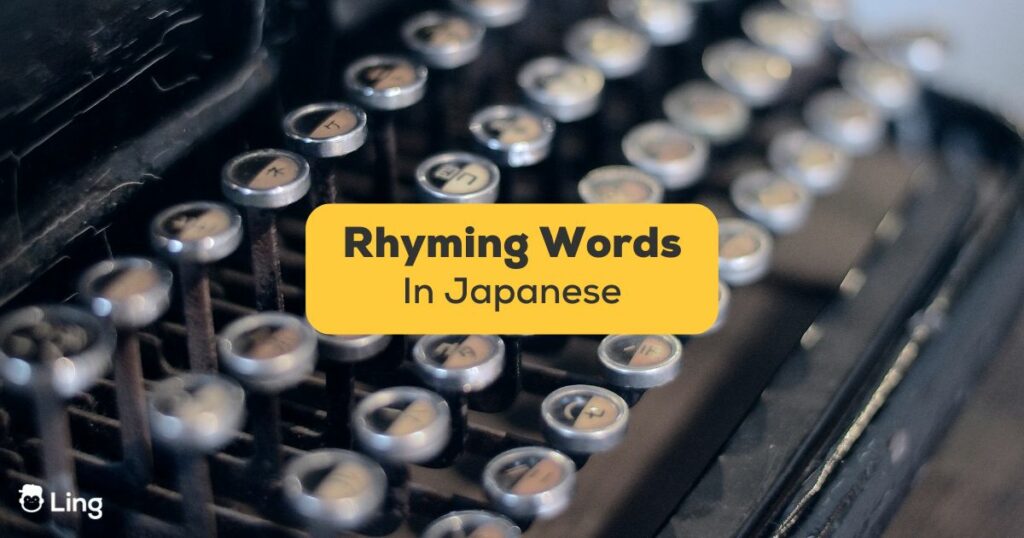Want to explore Japanese literature by learning rhyme patterns and rhyming words in Japanese? If so, read on!
I’ll explain classic Japanese rhymes like onji and shiritori. I’ll keep things simple to avoid boring details. In this blog post, you’ll see how Japanese poets play with sounds to make them rhyme. They craft lovely rhyming verses and lyrics that captivate you. But before we get to the Japanese rhyme patterns, let’s make sure we understand rhyming words correctly.
What Are Rhyming Words?
Rhyming words can be described as two words (or more) that end with similar sounds, creating harmony. These kinds of words play an important role in poetry and songwriting everywhere across the world. They help songwriters and poets create cohesion, rhythm, and melody within their writing, making a written piece sound more aesthetic and memorable.
Does Japanese Have Rhyming Words?
Yes, rhyming words exist in Japanese. However, they differ from other languages, like English. In Japanese, rhymes often rely on patterns of sounds and their arrangements. Rather than exact consonant and vowel matches. You will see some examples in a bit.
Types Of Rhyming Patterns In Japanese Poetry
Japanese poetry leverages rhyming patterns for depth and musicality. Enriching reader experiences with rhythmic charm. Two prominent types of Japanese rhyme are Phonetic Rhyme (Onji) and Consonant Rhyme (Shiritori). Onji relies on sound patterns, while Shiritori, which is actually a word game in Japanese, showcases consonant rhyming. Let’s find out how these two patterns contribute to rhyming in Japanese.
Phonetic Rhyme (Onji)
Traditional Japanese poetry, like “haiku,” flows with repeated sounds. Words holding similar kana syllables blend harmoniously. Rhyming builds on matching phonetics rather than letters. Words ending with the same kana or having alike sound combinations create rhythmic unity.
Consonant Rhyme (Shiritori)
Shiritori is a Japanese word game and thus is not really used in literature. The Japanese game “shiritori” displays a rhyming style based on consonants. For example, Player 1 should say a Japanese word ending with the sound “u,” like “すもう (sumou),” and Player 2 should say a Japanese word beginning with the sound “u” such as “うどん (udon).” Although it focuses on consonants rather than full words, it showcases the connection between Japanese rhyming and phonetics.

Examples Of Rhyming Words In Japanese Literature
Japanese literature excels with eloquent language, featuring poetic rhymes to evoke deep emotions. And they are good at creating a vivid imagery in your mind through masterful word selection. Here are some popular examples from Japanese poetry with their original Japanese, followed by romaji versions and English translations:
1. Matsuo Basho’s poem:
花の色は (Hana no iro wa)
移りにけりな (Utsuri ni keri na)
いたづらに (Itazura ni)
English Translation:
“The color of the flowers
Has already faded away,
While in idle thoughts
It has been long neglected.”
As you can see, Basho’s poem beautifully depicts nature’s short-lived charm and life’s fleeting moments. When it comes to rhyming, the sound “a” is repeated in Japanese particles “wa” and “na,”creating a gentle rhythm, reflecting time’s passing.
2. Yosa Buson’s poem:
花の香や (Hana no ka ya)
ふくまでのあたり (Fukumade no atari)
はやわかり (Haya wakari)
English Translation:
“The scent of flowers,
Even before they bloom,
Already perceived.”
Buson’s poem depicts nature’s hidden and pretty fragrance. I think it shows a longing for spring and blossoms’ sweet scent. When we look at the rhyming, the words “atari” and “wakari” repeat a “ri” sound flowing gracefully.
3. Kobayashi Issa’s poem:
葛の花 (Kuzu no hana)
くずしものがたり (Kuzushi monogatari)
ありけり (Arikeri)
English Translation:
“The kudzu flower
Tales of destruction
It did tell.”
The kudzu flower is a delicate and pretty flower, but nature can destroy pretty things like it. In Issa’s poem, the verbs “arikeri” and “monogatari” repeats a “ri” sound. It reminds us that life keeps going despite challenges.
Japanese poets use rhyming sounds beautifully, and they select words very carefully. Then they arrange the sounds in a special way. Japanese poets like Basho, Buson, and Issa do this, which we have already analyzed. Their poems have something in common; they all show the amazing complexity of nature. With rhymes, they bring nature’s profound beauty to life, and these rhyming poems leave a lasting legacy in Japanese literature.
A List Of Rhyming Words In Japanese
Here are some examples that demonstrate the diverse range of rhyming words in Japanese, reflecting the richness of the Japanese language and its poetic side:
- Cherry blossom – Sakura (さくら) / Spring – Haru (はる)
- Dream – Yume (ゆめ) / Shark – Same (さめ)
- Love – Koi (こい) / Light – Hikari (ひかり)
- Water – Mizu (みず) / Cold – Tsumetai (つめたい)
- Moon – Tsuki (つき) / Light – Hikari (ひかり)
- Wind – Kaze (かぜ) / Sky – Sora (そら)
- Sea – Umi (うみ) / Wave – Nami (なみ)
- Flower – Hana (はな) / Sky – Sora (そら)
- Snow – Yuki (ゆき) / Cold – Samui (さむい)
- Life – Inochi (いのち) / Light – Hikari (ひかり)
- Heart – Kokoro (こころ) / Sky – Sora (そら)
- Forest – Mori (もり) / Light – Hikari (ひかり)
- Night – Yoru (よる) / Star – Hoshi (ほし)
- Sun – Taiyo (たいよう) / Sky – Sora (そら)
- Cloud – Kumo (くも) / Light – Hikari (ひかり)
- River – Kawa (かわ) / Marsh – Sawa (さわ)
- Earth – Tsuchi (つち) / Wind – Kaze (かぜ)
- River – Kawa (かわ) / Rope – Nawa (なわ)
- Dream – Yume (ゆめ) / Sky – Sora (そら)
- Wind – Kaze (かぜ) / Feather – Hane (はね)
Final Words
Rhyming words in Japanese give poems and songs more meaning. Sounds in Japanese go together in special ways. They don’t rhyme like English, but they still sound nice and harmonious. Learning about rhyming in Japanese helps you see the Japanese language and art on a deeper level. Even with different rhymes, it makes listening feel good when words sound pretty together. By studying Japanese rhymes, you will be able to discover many beautiful things about Japanese literature and poetry that you would otherwise never have noticed.



































































